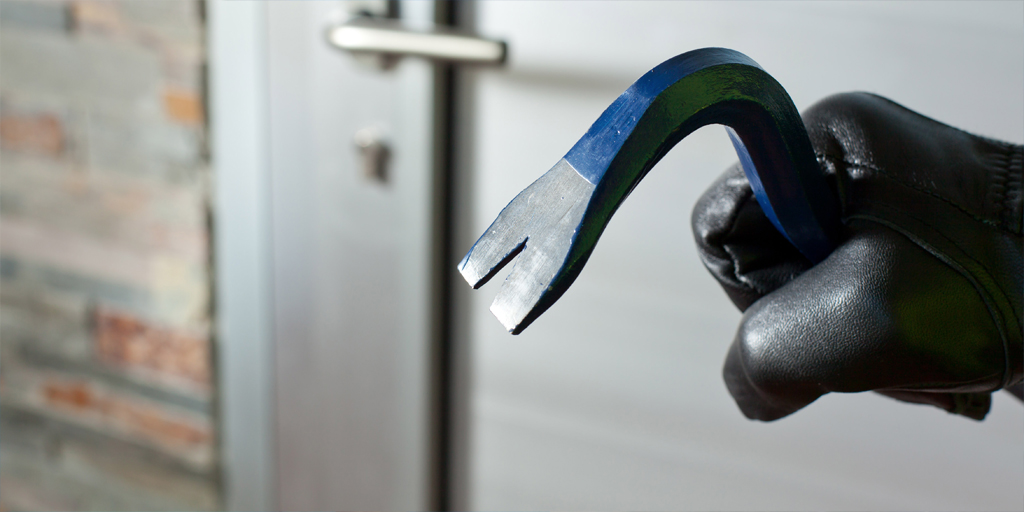When is a Burglar Most Likely to Strike?
By Peter Alligan, Managing Director at Eurotech Security Systems
–
A large part of keeping your home safe is knowing when thieves tend to strike. As a general rule, burglars are more likely to enter your house when they believe that you will not be home, since this provides the least amount of resistance. By being aware of when a burglar is most likely to strike, you can take the necessary precautions and keep your house safe throughout the year.
Time of Year
Most burglaries occur after the weather warms up in the Spring. This is largely because homeowners are more likely to leave their windows open during the day to catch a breeze than they are during the winter. When someone wants to enter your home, he or she will look for the easiest way possible. If you leave a window open or a garage door unlocked, it provides the perfect access point. Even if you only leave your house for a few minutes, it leaves enough time for someone to enter your home.
Burglaries are also common in the Summer. In fact, July and August have the two highest instances of burglaries out of any months of the year. This is likely because more people go on holiday during these months, so homes are left unoccupied for longer periods. If a thief knows that you are not returning to the home that day, he or she has time to develop a plan on entry into your home.
Time of Day
No matter the time of year, burglaries are more likely to occur between 10 AM and 3 PM. This is because the home is most likely to be empty between these hours. During the day, people tend to be at work and the kids will be at school, so there is little chance that anyone is home.
In most cases, the burglar is only in the home for about 15 minutes. Since burglars want to look as innocent as possible, they usually try knocking on the front door before they enter. If no one answers the door, they will try to open the door to see if it is unlocked. After that, they may try breaking in through the front door or looking for a window that has been left ajar.
Once in the home, most burglars go immediately for the master bedroom. This is because people often leave their valuables in this bedroom and most of these valuables are untraceable. Keep in mind that experienced burglars will probably have an idea of your home’s floor plan before breaking in, so they can head straight for their desired area.
What You Can Do
To prevent your home from becoming a target, it is important to take the necessary precautions. For starters, always lock your doors and windows when you are away from the home, even if you will only be gone for a few minutes. Adding a deadbolt to your front door makes it more difficult to access your home, which can scare burglars off.
If you have plants or bushes in your garden, make sure that they are well maintained. This provides a potential burglar with fewer places to hide in your garden, so you do not have to worry about someone staking the home out and waiting for you to leave. Have someone stop by periodically to remove mail and newspapers from your postbox and put them in the house while you are on holiday. Even though most burglaries occur during the day, add some automatic timers to your lights, to make it look like the house is occupied at night.
Electronic Security Options
Installing an intruder alarm system with an external bell acts as a deterrent. In addition, small warning signs warning that an alarm if fitted can be provided by your alarm company. The signs should be put near door handles and windows where an intruder might initially try to break in. Also consider a CCTV system, again these give the impression that the intruder is being watched and as such they will tend to avoid your home.
There are also entryphones now that will link to your mobile so if an intruder comes to your home and presses the button to see if your there, this will call your mobile and you can talk to the person as if you were at the house. Again this will give the impression that you are in. Finally low wattage LED lighting give a “lived in feeling” that you are home, so consider this both on internal and some external lights.
When is a Burglar Most Likely to Strike?
- Burglars target homes when occupants are believed to be absent for minimal resistance.
- Being aware of peak burglary times helps take necessary precautions for home safety.
Time of Year
- Spring sees an increase in burglaries due to open windows for fresh air.
- Summer months like July and August have high burglary rates as more people go on vacation, leaving homes unoccupied.
Time of Day
- Burglaries are more likely between 10 AM and 3 PM.
- Homes tend to be empty during these hours, with residents at work or school.
Burglar Behavior
- Burglars spend about 15 minutes inside homes to minimise suspicion.
- They may knock on the door and check if it’s unlocked before attempting entry.
- Master bedrooms are often the first target due to valuable and untraceable items.
- Experienced burglars may know your home’s layout, allowing them to quickly reach desired areas.
Preventive Measures
- Always lock doors and windows, even for short absences.
- Install deadbolts for added security.
- Maintain garden plants to reduce hiding spots.
- Arrange for mail and newspapers to be collected while on vacation.
- Use automatic timers for lights to create the illusion of an occupied house.
Electronic Security Options
- Intruder alarm systems with external bells act as deterrents.
- Warning signs about alarms can be placed near potential entry points.
- CCTV systems discourage intruders as they feel watched.
- Entryphones linked to mobile phones create the appearance of someone being home.
- Low-wattage LED lighting, both indoors and outdoors, creates a lived-in feeling.
Summary: Burglaries tend to occur when homeowners are away, seeking the path of least resistance. Being informed about peak burglary times enables taking effective precautions for home security. Warmer months like Spring and Summer see higher burglary rates due to open windows and extended vacations. Burglars usually strike between 10 AM and 3 PM when homes are likely to be empty. They spend a short time inside, focusing on valuable master bedrooms. Preventive measures include locking doors and windows, using deadbolts, maintaining gardens, and employing timers for lights. Electronic security options like intruder alarms, CCTV, entryphones, and LED lighting contribute to deterring burglars and creating the impression of an occupied home.

